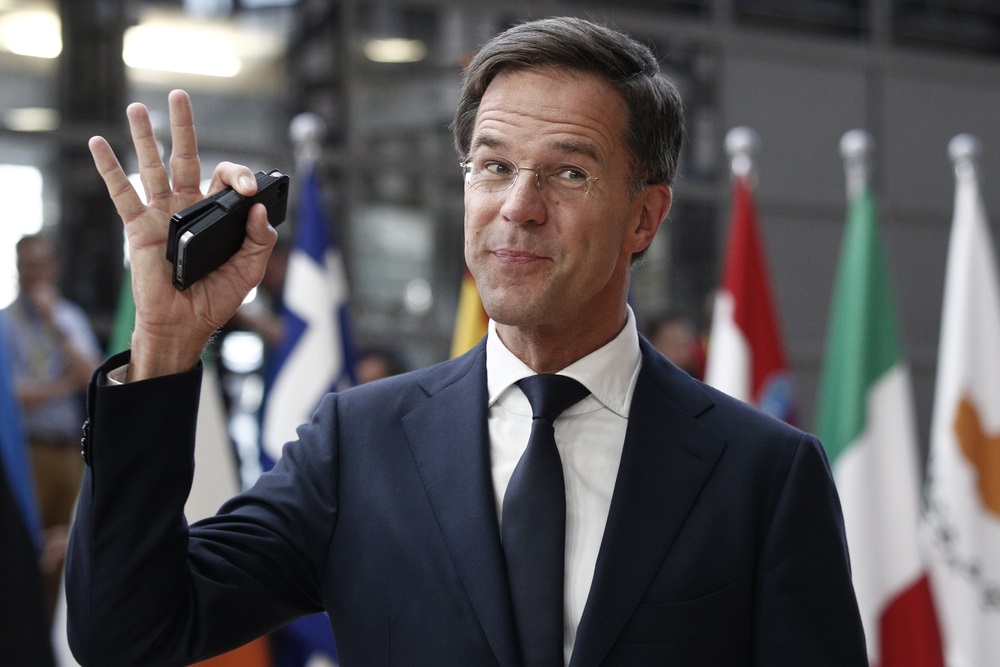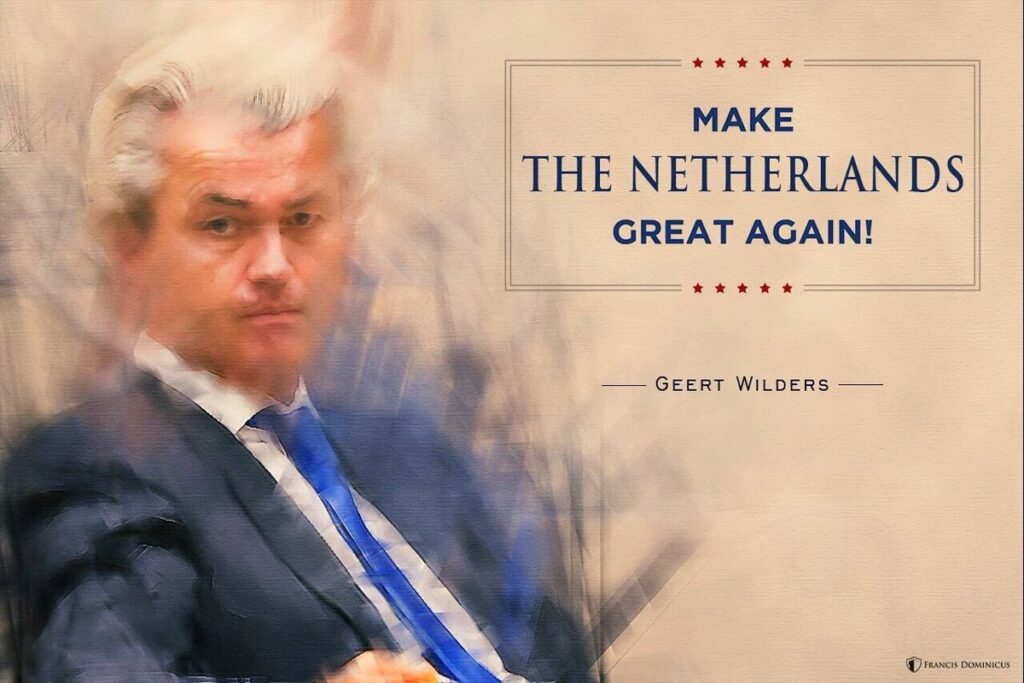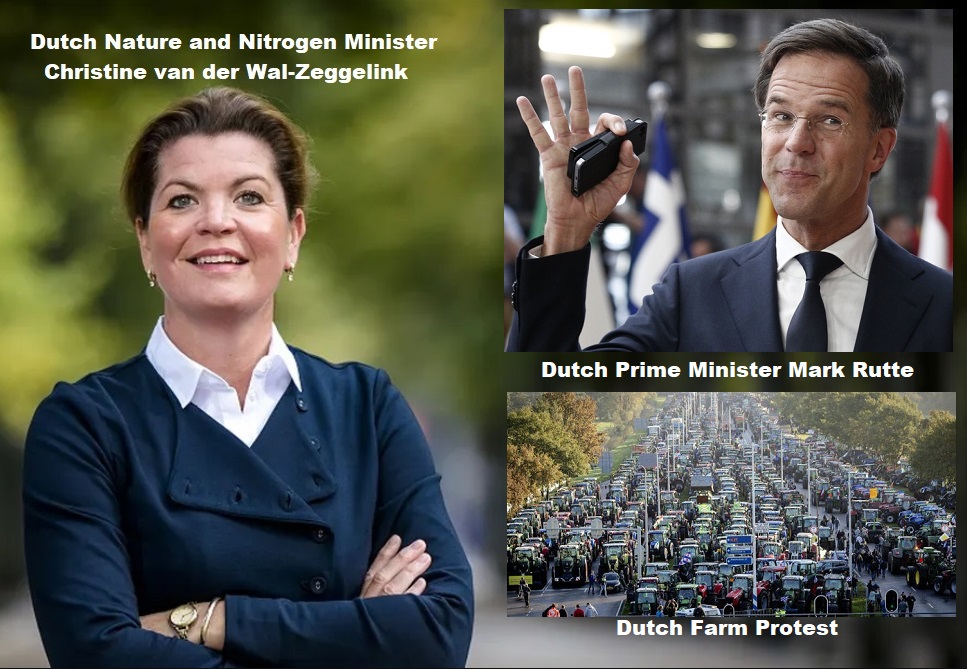The Netherlanders are a rather dramatic sort, organizing their system of governance on coalitions of various shades that agree to high-minded pleasantries as a way to remain above the fray of pesky conflict. Alas, once a moment of core and consequential disagreement reaches an impasse, the entire Dutch government is said to “collapse.”
 The Dutch Prime Minister Mark Rutte traveled to Tunisa earlier this year, together with EU leaders, pledging €1 billion in assistance if the North African gatekeepers could just stop the flow. The effort didn’t work, and his small country of 18 million, already dealing with major internal conflict driven by farmers and climate change, could not cope with the toxic political challenge of increased unlawful migration.
The Dutch Prime Minister Mark Rutte traveled to Tunisa earlier this year, together with EU leaders, pledging €1 billion in assistance if the North African gatekeepers could just stop the flow. The effort didn’t work, and his small country of 18 million, already dealing with major internal conflict driven by farmers and climate change, could not cope with the toxic political challenge of increased unlawful migration.
Associated Press – The ruling Dutch coalition collapsed Friday after tense talks among the four parties in Prime Minister Mark Rutte’s ruling bloc failed to broker a deal over ways to rein in migration, a senior politician said.
Henk Kamp, a senior member of Rutte’s People’s Party for Freedom and Democracy told Dutch television: “It is a great shame that the government has now fallen.” The failure of months of talks on the thorny issue could now force a general election.
Rutte’s Cabinet gathered late Friday in a hastily scheduled meeting. “We talked for a long time, we are coming here tonight because we did not succeed,” Defense Minister Kajsa Ollongren told reporters as she walked into the Cabinet meeting.
 Meanwhile, opposition lawmakers wasted no time in calling for fresh elections.
Meanwhile, opposition lawmakers wasted no time in calling for fresh elections.
Geert Wilders, leader of the anti-immigration Party for Freedom, tweeted, “Quick elections now.” Jesse Klaver, leader of the Green Left party also called for elections and told Dutch broadcaster NOS: “This country needs a change of direction.”
Rutte, the Netherlands’ longest serving premier, presided over late-night meetings Wednesday and Thursday that failed to result in a deal. More talks were held Friday evening, and he declined to answer questions about the issue at his weekly press conference before the discussions.
[…] There will likely be an election for the 150-seat lower house of the Dutch parliament later this year amid a polarized and splintered political landscape. Rutte’s Cabinet would likely remain in office as a caretaker administration until a new government was formed.
During provincial elections earlier this year, a populist pro-farmer party put Rutte’s party into second place. The defeat was seen as a possible incentive for Rutte to do his utmost to hold together his coalition until its term ends in 2025. (read more)

The US State Department and the Soros cabal are already flooding the zone with operatives to prevent a conservative populist win.
The same thing happened in Sri Lanka. The government there wanted to have the best ESG scores in the world, and disallowed the use of fertilizers, and the country’s ability to provide food for its people was destroyed. The economy collapsed and the people then stormed the Presidential palace, which eventually caused the government collapse. Following the same playbook, Marc Rutte was highly praised by Klaus Schwab for his policies on decreasing the amount of nitrogen in the soil, reducing the number of animals allowed per farm, and destroying the ability of Dutch farmers to provide food for their nation and for export. The farmers protested. This eventually brought down the government. It shows that we, the People, have the power to force governments to change.
Marc Rutte and Klaus Schwab are antihuman, inhuman scum comparable to those who they are the disciples of such as Stalin, Mao, Pol Pot, Hitler, . . . etc. All guilty of similar types of crimes against humanity. Stalin did a similar thing to the farmers in Ukraine which triggered millions to die of famine there. Now the disciples like Schwab and Rutte are merely carrying out the same plan to murder as many of the indigenous people as possible before they’re deposed, resign, suicide or executed by some military tribunal.
History shows that this kind of external policy threat towards a nation is not sustainable. Much like the covert Israeli options exercised in the 1970s to liquidate the Black September terrorists, the next patriotic American president must authorize and support similar cover units in the hundreds to permanently remove these kinds of external threats to the United States (and I would argue, Western civilization itself.)
But unlike the stingy Israeli Moss ad units, the US of A has plenty of resources to devote to this patriotic duty of defense. These problems will be gone in 18 months, with the right political will and strong men and women supporting these strategic actions. This nation will be proud of what we will ask our citizens to achieve, world opinion be damned (and most likely also targeted and removed from the discussion).
These lunatics do not know whom they are F’ing with.
Please discuss what’s gonna be different this time around.
Schwab—WEF will fail just like Stalin, Hitler, but the wake of destruction will be similar.
EU will fall first – France, Netherlands.
Where’s Merkle who forced this immigration on the EU.
Other leaders were just sheep to slaughter. Weak people. There isn’t going to be any place for M.acron, M.erkle to hide.
Hitler was fighting for Germany against the League of Nations and Bolshevik communists. These same groups have evolved into today’s UN/CFR/Trilateral Commission/WEF.
You need to unlearn what you have learned. Watch “Europa-The Last Battle” on Bitchute to begin your journey to the truth of WW1/WW2.
I follow the #1 accurate source that has never been wrong in 45 years.
EU will fail b/c they never consolidated the debt. Only made a Euro.
Asian falls next. USA last to go.
In the meantime Schawb/WEF + his woksters will fail, but the devastation will be tremendous.
You follow your route I’ll follow mine. It’s Socrates forecast (in any category forecasted) has never been wrong in 45 years.
HINT: Follow the $$$/currencies.
Meet the new boss, same as the old boss. Unless they force real change. Unfortunately, that rarely happens peacefully.
I think Christine and her husband control the flow of food from the farmers to the people in some way. I remember reading about that. somewhere.
New grocery store concept,startup financed by ol’ Bitch Tits himself Bill Gates. The farmers burnt one of them down last year.
We the People need to punish traitors correctly via trial and swift hangings. Not slap on the wrist and just let resign.
I assume the Dutch people want no part of the UN’s One World depopulation effort, either. At least their farmers had a show of force.
Wake up Holland! The mussleman is at your doors and your country will be the next one that has fallen to sword and scimitar without a shot being fired.
That criticism cannot be waged from these shores.
It surely can as a plea.
The current government doesn’t represent the interests of the Dutch people.
Rutte and his cabinet are owned by the WEF.
The story needs to be told so the Dutch will understand why the current government is trying to destroy the agribusiness sector in their country. The WEF end game will destroy the Netherlands if fully implemented.
The Dutch are the tallest people in the world, pray for their sovereignty 🙂
There are many reasons to support the Dutch people in their struggle. I have to admit, that reason is a new one.
Their tall women _are_ hot, that is a fact…
Check out the citizen journalist that is getting the word out named Eva Smoking Hot, if you have any doubt. (Can’t remember her last name let alone pronounce it) She is basically the Sundance of the the Netherlands except way prettier.🤗 Sorry Sundance.🤣😹🤣
Eva Vlaardingerbroek.
Her surname is easy to remember and pronounce if you approach it as consisting of three simple words.
👍😊
Their monthly migrant to total population ration is 0.03 and it has caused a govt collapse. Ours is 0.06.
Jesse Klaver, leader of the Green Left party also called for elections and told Dutch broadcaster NOS: “This country needs a change of direction.”
Hard to imagine what could come next after forcing farmers off their land.
Into gas chambers?
Dark continent imports will play that role.
The Dutch suffer from a permanent desire to get along.
If only they could get Geert Wilders in there who is nicknamed the Dutch Donald Trump
the globalist cannot be allowed to just walk away after all the destruction they have caused.There must be consequences,a lifetime spent to expiate their sins,or they need to be stood against a wall.
Aside from the maniacal effort to stop food production, Rutte still lives in The Hague and likes to keep his private life private. It is known that he is a bachelor who holidays with his mother in the town of Putten in Gelderland.
One of his elder brothers died from AIDS in the 1980s.
Oh and he drives an old Saab.
If you think they are, THEY ARE
The Dutch have always been mealy mouthed Collectivists. There is no chance they will ever become anything else. Long ago, they focused on trying to be the greatest trading power in Europe. Now, they have almost no focus.
They are no different from most of socialist western Europe.
But they absolutely DO focus on keeping the sea from flooding their land…..
The Netherlands lies in the middle of a delta of three major rivers on land, mainly below sea level. As such, about 26% of the Netherlands is below sea level, and 59% of the Netherlands is vulnerable to flooding by the sea in case of high tide and severe storms.
This is WONDERFUL NEWS!
American Thinker link below is a chilling, but candid assessment of what is really a central issue for the immigration problem facing Western Civilization in Europe and beyond. The West is failing, the legacy of Western Civilization is being dismissed by ignorant, arrogant, Marxists who have embraced centralized governance as a solution for all things. The core point if the article should be an epiphany for the West:
“Since the young man does not mention religion, it can’t be “Islamophobia” to point out where this vision of the current insurrection is heading. He is all about vengeance, a powerful motive in human life, albeit one which leftists, who clothe themselves in the garments of lofty ideals like “equity” and “justice,” are loath to admit.
Stepping back from the immediate circumstances in France, those of us who are the products of Western Civilization must face an uncomfortable reality. We have dominated the planet for almost four centuries, thanks to the military might that grew out of the scientific and technological revolutions with their origins in the Renaissance and Enlightenment. Gunpower, firearms and cannons, and later steam engines, airplanes, and other industrial/technology marvels enabled Westerners to impose their will on other peoples….”
https://www.americanthinker.com/blog/2023/07/a_french_algerian_explains_the_riots_there_clearly_and_concisely.html
A Trans immigrant just won the Miss Netherlands competition for Miss Universe. Point made…
https://www.pageantcircle.com/2023/07/final-results-miss-nederland-2023-miss-universe-netherlands-2023-is-rikkie-valerie-kolle-for-miss-universe-2023.html
Jeepers.
How fitting is it that the newly crowned “Miss Netherlands 2023” is a biological male? You elect Leftists to run your government and no matter what they touch, you get nothing but cultural suicide.
Why are there so any sexual deviants running western nations?
Because most western governments are bloated with pedophiles, drug addicts and cross-dressers?
Deviants are compromised easier. And do what their told. Plus most go through a casting process to gauge likability among different demographics not to mention they are skilled at lying because they have been hiding their freakdom.
“…major internal conflict driven by farmers and climate change…”
A little context is needed for those two issues in the Netherlands.
The conflict is NOT driven by farmers, nor by “climate change.”
The conflict is driven by the insane, anti-human policies the government has imposed, and plans to impose on farmers using the excuse of “climate change.”
So, the Dutch government is the driver of the conflict. Using the hate-filled fraudulent “climate science” as their excuse, the government’s policies will destroy farmers.
The farmers have reacted with well-deserved outrage.
So the internal conflict in the Netherlands is driven by the government. The government, their “experts,” and the PC-Prog clique are the problem.
The Dutch are happy because they keep such low expectations.
They selected a man as Miss Neatherlands, so what do you expect?
Until the migrant invasion problem is solved, no Dutch or other Western European government will remain stable for very long. France is the first major example but the Dutch aren’t too far behind.
Everyone supporting the nitrogen reduction efforts should be retired permanently.
My Aunt has lived there all of my life and it is a country I know extremely well and have enjoyed, Hup Hup Holland. I am in my 50s.
Rutte has been in power since 2010. The guy is a total sleaze in my opinion. The Dutch have been complaining about immigration. 20 years ago it was the Irish, 10 years ago the Polish, and now they have huge numbers coming from everywhere and nowhere to put them but upon stolen farm land. The Dutch have also lost their collective minds when they lost the Guilder. I noticed a distinct change in city people about that time.
There is a torture museum in the Hague, I highly recommend going if you are there visiting. The top level is where the pauper was housed. There is a one bunk with a carving of a sailing ship someone made in the early 1700s. It is very cool. My point is the modern EU Dutch have lost that spirit. Even the political speeches have become Justin Makron-ish crossed with Sunak. Yuck!
Rutte is the first WEF Global Citizen awarded the title in 2019 by Schwabby himself.
I do not know if they can right the country. I really hope so.
Als God het wil!
Hup Hup!
May this be the first domino.
The best government is one that is able to collapse when the electorate at large, rejects its policies.
We need one of those. Government is but the manifestation of our founder’s vision and Documents, and it is the one thing in the entire equation that is disposable.
A part of me thinks that he’ll be back. Especially considering that he’s seen his past governments fall before. The government is all run by open borders people from what I’ve heard. They just pretend to be aggressive every now and then to get the heat off of them.
Kinda like our rinos here. Looks familiar?
Rutte and his admin should be tried for treason and hung when found guilty.
For some reason, I initially read the opening line as “the Neanderthals are a rather dramatic sort,…”
Quite amusing.
THe Dutch need to save the farmers, and stop immigration (legal and illegal). Holland is one of the most densely populated countries in the world. Why in the hell do they need MORE people? And many of these “Migrants” are adding little to the country economically or in any other way.